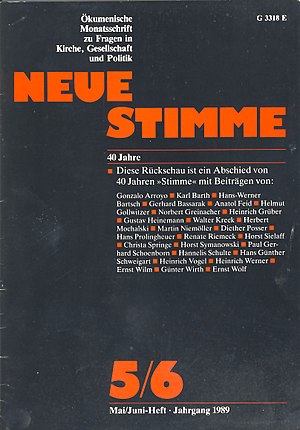The voice of the community
The voice of the community was a semi-annual or, from 1974, a monthly magazine that spoke about church life, politics, economy and culture. It was published by the Brother Council of the Confessing Church in Germany and existed under several changes and with changing titles for over 40 years from 1949 to 1989.
| The voice of the community | |
|---|---|

|
|
| description | Semi-monthly or monthly |
| Area of Expertise | Church, politics, science, culture |
| language | German |
| publishing company | Brother Council of the Evangelical Church in Germany , since May 1974 STIMME-Verlag, since January 1977 Pahl-Rugenstein-Verlag |
| First edition | January 1, 1949 |
| Frequency of publication | bi-monthly or monthly |
| Editor-in-chief |
Herbert Mochalski and Herbert Werner |
| editor | Brother Council of the Evangelical Church in Germany |
| CODEN | F 6508 D until May 1974, as "New Voice" 1 Y 21970 E, since January 1977 G 3318 EX% 22 & key = cql 1 F 6508 D until May 1974, as "New Voice" 1 Y 21970 E, since January 1977 G 3318 EX |
editor
The magazine initially published for the fraternity:
- Martin Niemöller
- Oskar Hammelsbeck
- Gustav W. Heinemann
- Hans Joachim Iwand
- Friedrich Karrenberg
- Ludwig Metzger
- Herbert Mochalski
- Karl Gerhard Steck
- Herbert Werner
History of the magazine
1st period from 1949 to 1959
At the end of this phase, the new editors included:
During this time the politician Heinemann and the social scientist Karrenberg resigned.
2nd period from 1960 to September 1, 1963
A more pleasing appearance was presented to the readers with the January number 1960 with the comment: "Above all, it will make posting in kiosks easier", which indicated that the newspaper was having problems with circulation. The sheet was now provided with a code number .
3rd period from September 15, 1963 to April 1974
New to the editorial team appeared
on. In the layout, the even more eye-catching text "Voice" was added diagonally across the title page. Some photos also appeared. Iwand (through death), Metzger and Werner had since retired. The staff at the magazine now had two different bodies:
Editorial team:
- Martin Niemöller
- Karl Linke
- Herbert Mochalski
- Karl Gerhard Steck
- Gotthilf Weber
Editorial staff:
- Karl Linke
- Hans-Werner Bartsch
- Mechthild Blanke
- Herbert Mochalski
- Hans Joachim Oeffler
- Joachim Perels
- Renate Riemeck
- Horst Stuckmann
4th period from May 1974 to December 1974
With the number 7/8 (April) of 1974, the publication mode was extended to a monthly cycle, so that the magazine has since been known as the “monthly”. Now the newspaper was called “New Voice”.
Instead of the Brother Council, the Evangelical Working Group “ Congregation in the World ” acted as the publisher . The publisher was the newly founded STIMME publishing house in Mainz .
Editorial staff:
- Hans Werner Bartsch
- Michael Höhn
- Renate Riemeck (responsible)
- Ulrich Schmitthenner
- Hannelis Schulte
- Horst Stuckmann
- Gerhard Wöbbeking
The makers justified the change with the meanwhile changed world situation as well as with the situation in the churches. Each issue should have a specific topic on which there should be well-founded information. In addition, they wanted to intervene more clearly in the theological and ecclesiastical debate. It was particularly emphasized that the magazine, which appears in the middle of the month, would also be delivered to the GDR and thus perform “a bridging service”.
5. Period from January 1975 as “New Voice” to December 1979
From January 1977 a change took place to the Pahl-Rugenstein-Verlag . In this phase the magazine is directed by:
Editor:
- Hans-Werner Bartsch
- Michael Höhn
- Werner Sanß
- Hannelis Schulte
- Horst Symanowski
- Heinrich Werner
Editorial staff:
- Anatol Feid
- Christa Jump
- Heinrich Werner (responsible)
6th period from January 1980 to June 1989
Since 1980 the paper has been published in a completely new design: a black cover with a printed title in red. The profiling of the content is also changing in the direction of transcending the Protestant denomination. The newspaper now defined itself as an “Ecumenical Monthly on Questions in Church, Society and Politics”. Correspondingly, the editorial and editorial team expanded to include Roman Catholic members. Newly added editors were Norbert Greinacher and Herbert Vorgrimler .
In the last issue 5/6 1989, with which the existence of the magazine ends, appeared as
Editor:
- Norbert Greinacher
- Michael Höhn
- Hans Joachim Oeffler
- Hans Prolingheuer
- Werner Sanß
- Hannelis Schulte
- Franz Segbers
- Horst Sielaff
- Horst Symanowski
- Herbert Vorgrimler
- Heinrich Werner
Editorial staff:
- Anatol Feid
- Martin Schuck
- Christa Jump
- Heinrich Werner (responsible)
The Pahl-Rugenstein-Verlag announced that the increased costs could not be made up for with the acquisition of new subscribers and that the publication would therefore have to be discontinued. The publishing house “ Junge Kirche ” entered into the existing subscription contracts .